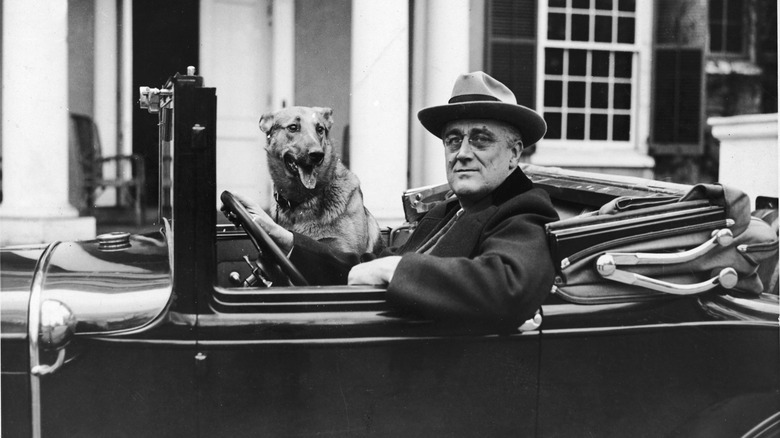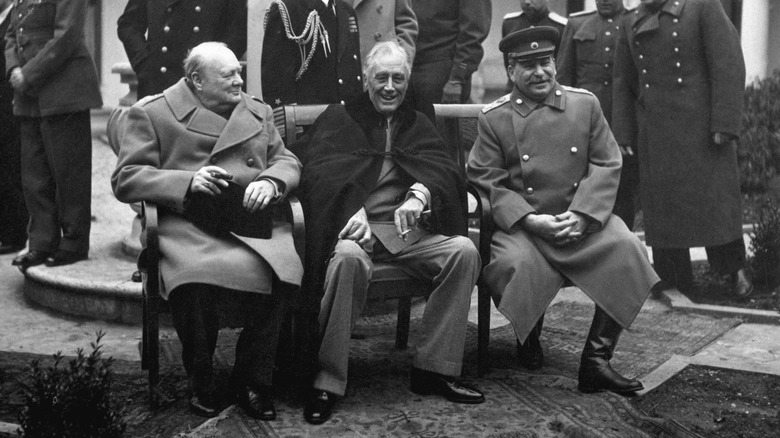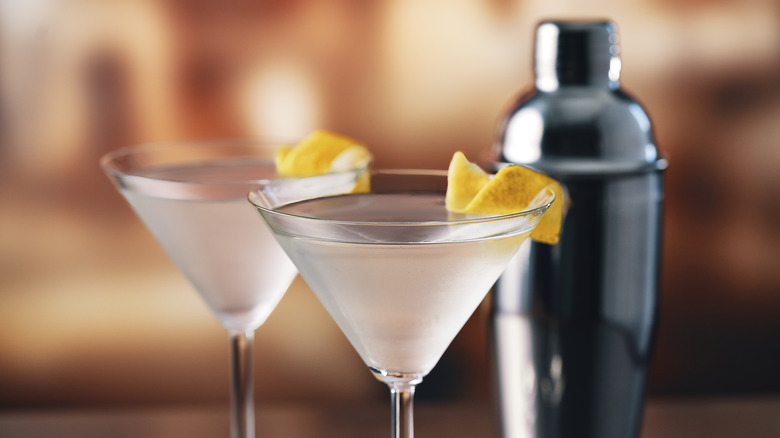How FDR Championed The Dirty Martini
It might be said that President Franklin Delano Roosevelt, or FDR, was destined to be a dirty martini drinker, given that he grew up in New York so near to the birth of the drink itself. Born in 1882, some 17 years after the Civil War ended, Roosevelt came into the world around the same time that the all-American cocktail began appearing in bartenders' manuals in the 1800s. Both FDR and the 'tini he loved so much were destined to make an impact on American culture, and eventually, their illustrious paths merged into one long and elevated cocktail hour when FDR held the White House.
FDR's connection with the dirty martini was the stuff of legend, so much so that he's sometimes credited with inventing it. However, it's thought that the original martini became a dirty martini in 1901 when a bartender by the name of John O'Connor added a splash or two of olive brine to the mix. Make no mistake, though — by all accounts, it was Roosevelt's favorite gin drink of choice. In fact, during his four-term presidency, he often turned to the dirty martini to get his buzz on, apparently quite frequently. In his hands, the martini, once a favorite of the so-called "gintellectuals" of the 1920s and early 1930s (per American Heritage), rose out of the speakeasies of the Prohibition era and emerged with the presidential seal of approval.
FDR, Stalin, and a martini toast
While the dirty martini didn't technically win World War II for the Allies, Franklin Delano Roosevelt made it a silent diplomat of sorts, serving it up at gatherings of heads of state, including one with Joseph Stalin. It was late fall, 1943, and the Allied leaders, including Stalin, were meeting in Tehran, Iran. On the docket? Stopping the Axis powers — plus a martini toast with a teaspoon of olive brine to wash the whole business down. According to the Franklin D. Roosevelt Library and Museum, Stalin wasn't necessarily a fan of the drink, claiming it to be "cold on the stomach," but he agreed to the toast, anyway.
Of course, Winston Churchill was in Tehran, too. Like Stalin, he also wasn't a fan of dirty martinis. Or any martinis, for that matter. For his part, Churchill thought the drink better belonged at the bottom of a flowerpot instead of the bottom of his stomach. He was, in fact, seen dumping a martini in such a receptacle, not while in Tehran, but at one point during his relationship with the American President (via Bevvy). Despite the dearth of enthusiasm from FDR's Allied friends, dirty martinis characterized diplomacy between the United States and the Soviet Union, with one official calling it the "four martinis and let's have an agreement" era, according to American Heritage.
FDR ignored Prohibition
Such was Franklin Delano Roosevelt's love of the dirty martini that he regularly gadded about the golf course with the tipple. Never mind that a pesky thing known as Prohibition was in full swing. Roosevelt ignored it as heartily as the flappers in U.S. speakeasy bars did. His brazenness was a bit unusual during that era, however. Many people who drank alcohol during that time mostly did it at home, where they could enjoy their bootlegged gin in peace. Most of the hooch of the era tasted nasty at best, though bootlegged gin's flavor was better than most, a fact that didn't hurt the martini's chances of survival. Unsurprisingly, those home-drinking sessions became the precursors to a new form of entertainment: the cocktail party.
When Prohibition was eventually rolled back in 1933, FDR, who was elected in 1932, became the first President to serve alcohol legally in the White House during this new era. The drink became popular at informal gatherings between Roosevelt and friends, which he christened "the Children's Hour." Absinthe. Olives. Fruit juice. All were fair game. His concoctions were apparently sometimes "truly awful," his grandson Curtis Roosevelt told the FDR Library and Museum, but given the abundance of martini riffs you'll find in bar books today, it's no wonder the drink caught on. Still, delish bevvies weren't the point — despite the impressive guest roster, the real purpose of the boozy meetings was to give FDR a break from his often crushing presidential duties.


